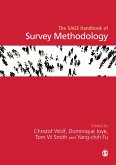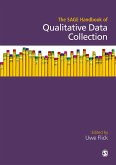The Sage Handbook of Survey Development and Application (eBook, ePUB)
Redaktion: Ford, Lucy R.; Scandura, Terri A.
93,95 €
93,95 €
inkl. MwSt.
Sofort per Download lieferbar

47 °P sammeln
93,95 €
Als Download kaufen

93,95 €
inkl. MwSt.
Sofort per Download lieferbar

47 °P sammeln
Jetzt verschenken
Alle Infos zum eBook verschenken
93,95 €
inkl. MwSt.
Sofort per Download lieferbar
Alle Infos zum eBook verschenken

47 °P sammeln
The Sage Handbook of Survey Development and Application (eBook, ePUB)
Redaktion: Ford, Lucy R.; Scandura, Terri A.
- Format: ePub
- Merkliste
- Auf die Merkliste
- Bewerten Bewerten
- Teilen
- Produkt teilen
- Produkterinnerung
- Produkterinnerung

Bitte loggen Sie sich zunächst in Ihr Kundenkonto ein oder registrieren Sie sich bei
bücher.de, um das eBook-Abo tolino select nutzen zu können.
Hier können Sie sich einloggen
Hier können Sie sich einloggen
Sie sind bereits eingeloggt. Klicken Sie auf 2. tolino select Abo, um fortzufahren.

Bitte loggen Sie sich zunächst in Ihr Kundenkonto ein oder registrieren Sie sich bei bücher.de, um das eBook-Abo tolino select nutzen zu können.
The SAGE Handbook of Survey Development and Application provides a practical resource that researchers can go to for cutting-edge tools to ensure they are employing the best survey research techniques.
This handbook not only covers the classic and innovational skills and approaches involved at every step of the survey research process, but also centres itself around applied, how-to guidance to aid readers in best practice.
Chapters engage with a broad range of topics including sampling issues, approaches to establishment of measurement equivalence, and the use of online labour pools in…mehr
- Geräte: eReader
- mit Kopierschutz
- eBook Hilfe
- Größe: 55.91MB
Andere Kunden interessierten sich auch für
![The Sage Handbook of Survey Development and Application (eBook, ePUB) The Sage Handbook of Survey Development and Application (eBook, ePUB)]() The Sage Handbook of Survey Development and Application (eBook, ePUB)93,95 €
The Sage Handbook of Survey Development and Application (eBook, ePUB)93,95 €![The SAGE Handbook of Survey Methodology (eBook, ePUB) The SAGE Handbook of Survey Methodology (eBook, ePUB)]() The SAGE Handbook of Survey Methodology (eBook, ePUB)100,95 €
The SAGE Handbook of Survey Methodology (eBook, ePUB)100,95 €![The Sage Handbook of Qualitative Research Quality (eBook, ePUB) The Sage Handbook of Qualitative Research Quality (eBook, ePUB)]() The Sage Handbook of Qualitative Research Quality (eBook, ePUB)93,95 €
The Sage Handbook of Qualitative Research Quality (eBook, ePUB)93,95 €![The Sage Handbook of Mixed Methods Research Design (eBook, ePUB) The Sage Handbook of Mixed Methods Research Design (eBook, ePUB)]() The Sage Handbook of Mixed Methods Research Design (eBook, ePUB)93,95 €
The Sage Handbook of Mixed Methods Research Design (eBook, ePUB)93,95 €![The SAGE Handbook of Qualitative Research Ethics (eBook, ePUB) The SAGE Handbook of Qualitative Research Ethics (eBook, ePUB)]() The SAGE Handbook of Qualitative Research Ethics (eBook, ePUB)100,95 €
The SAGE Handbook of Qualitative Research Ethics (eBook, ePUB)100,95 €![The Essential Guide to Doing Your Research Project (eBook, ePUB) The Essential Guide to Doing Your Research Project (eBook, ePUB)]() Zina O'LearyThe Essential Guide to Doing Your Research Project (eBook, ePUB)114,95 €
Zina O'LearyThe Essential Guide to Doing Your Research Project (eBook, ePUB)114,95 €![The SAGE Handbook of Qualitative Data Collection (eBook, ePUB) The SAGE Handbook of Qualitative Data Collection (eBook, ePUB)]() The SAGE Handbook of Qualitative Data Collection (eBook, ePUB)100,95 €
The SAGE Handbook of Qualitative Data Collection (eBook, ePUB)100,95 €-
-
-
The SAGE Handbook of Survey Development and Application provides a practical resource that researchers can go to for cutting-edge tools to ensure they are employing the best survey research techniques.
This handbook not only covers the classic and innovational skills and approaches involved at every step of the survey research process, but also centres itself around applied, how-to guidance to aid readers in best practice.
Chapters engage with a broad range of topics including sampling issues, approaches to establishment of measurement equivalence, and the use of online labour pools in survey development.
With contributions from a global community of leading and emerging scholars across a wide variety of disciplines, this Handbook is focused on being applicable and accessible across the social sciences.
Containing over 120 tables and figures, checklists and tutorial guides, The SAGE Handbook of Survey Development and Application will serve as a one stop resource for survey research.
This handbook serves as a touchstone for a variety of fields such as Organizational Behavior, Industrial & Organizational Psychology, Management, Psychology, Educational Research, Marketing, Public Policy, and others.
PART 1: Conceptual Issues and Operational Definition
PART 2: Research Design Considerations
PART 3: Item Development
PART 4: Scale Improvement Methods
PART 5: Data Collection
PART 6: Data Management and Analysis
PART 7: Research Production and Dissemination
PART 8: Applications
This handbook not only covers the classic and innovational skills and approaches involved at every step of the survey research process, but also centres itself around applied, how-to guidance to aid readers in best practice.
Chapters engage with a broad range of topics including sampling issues, approaches to establishment of measurement equivalence, and the use of online labour pools in survey development.
With contributions from a global community of leading and emerging scholars across a wide variety of disciplines, this Handbook is focused on being applicable and accessible across the social sciences.
Containing over 120 tables and figures, checklists and tutorial guides, The SAGE Handbook of Survey Development and Application will serve as a one stop resource for survey research.
This handbook serves as a touchstone for a variety of fields such as Organizational Behavior, Industrial & Organizational Psychology, Management, Psychology, Educational Research, Marketing, Public Policy, and others.
PART 1: Conceptual Issues and Operational Definition
PART 2: Research Design Considerations
PART 3: Item Development
PART 4: Scale Improvement Methods
PART 5: Data Collection
PART 6: Data Management and Analysis
PART 7: Research Production and Dissemination
PART 8: Applications
Dieser Download kann aus rechtlichen Gründen nur mit Rechnungsadresse in A, D ausgeliefert werden.
Produktdetails
- Produktdetails
- Verlag: SAGE Publications
- Erscheinungstermin: 29. Juni 2023
- Englisch
- ISBN-13: 9781529618327
- Artikelnr.: 68346147
- Verlag: SAGE Publications
- Erscheinungstermin: 29. Juni 2023
- Englisch
- ISBN-13: 9781529618327
- Artikelnr.: 68346147
- Herstellerkennzeichnung Die Herstellerinformationen sind derzeit nicht verfügbar.
Lucy R. Ford is Professor Emerita, Management, at Saint Joseph's University, after retiring as an Associate Professor in 2023. From 2016 to 2021 she served as the Director of the Human Resources and People Management program. She also previously served on the faculty at Rutgers University. Her research interests include leadership, teams, and applied research methods. Dr. Ford has authored or co-authored over sixty presentations, articles, and book chapters. Her research has been published in Organizational Research Methods, Journal of Organizational Behavior, Human Performance, Journal of Occupational and Organizational Psychology, and Journal of Business and Psychology, amongst others. Dr. Ford has served on the board of the Research Methods Division of the Academy of Management as both a student representative and as an elected member at large. She has also served as a member of the Board of Governors of the Southern Management Association. In 2012 she and her co-author received the Sage Publishing / Research Methods Division Best Paper Award for her work on item miscomprehension in surveys, and also in 2012 she and her coauthors received the Emerald Citation Award for their 2008 scale development paper in the Journal of Occupational and Organizational Psychology. She has also served on the editorial board of Group and Organization Management. She has presented Executive Education programs on Leadership, Leading Change, Teams, Conflict, Systems Thinking, Legal Issues in HR, Performance Management, and other topics to numerous organizations. Terri A. Scandura is currently the Warren C. Johnson Professor of Management in the Miami Herbert Business School at the University of Miami. From 2007 to 2012, she served as Dean of the Graduate School of the university. Her fields of interest include leadership, mentorship, and applied research methods. She has been a visiting scholar in Japan, Australia, Hong Kong, China, and the United Arab Emirates. Dr. Scandura has authored or coauthored over 200 presentations, articles, and book chapters. Her research has been published in the Academy of Management Journal, the Journal of Applied Psychology, the Journal of International Business Studies, the Journal of Vocational Behavior, the Journal of Organizational Behavior, Educational and Psychological Measurement, Industrial Relations, Research in Organizational Behavior, Research in Personnel and Human Resource Management, and others.She has presented executive education programs on leadership, mentoring, leading change, and high-performance teams to numerous organizations such as VISA International, Royal Caribbean Cruise Lines, the Young Presidents Organization, Hewlett-Packard, and Baptist Health Systems.Dr. Scandura is a Fellow of the Society for Industrial & Organizational Psychology, the American Psychological Association, and the Southern Management Association. She is a member of the Society of Organizational Behavior and the Academy of Management. She is a past associate editor for Group & Organization Management, the Journal of International Business Studies, the Journal of Management, and Organizational Research Methods. She currently serves on editorial boards for major journals including The Leadership Quarterly, Organizational Research Methods, and Group & Organization Management.
Chapter 1: Introduction - Lucy R. Ford, Terri A. Scandura
PART 1: Conceptual Issues and Operational Definition
Chapter 2: A Framework for Evaluating and Creating Formal Conceptual Definitions: A Concept Explication Approach for Scale Developers - Serena Miller
Chapter 3: Group Concept Mapping for Measure Development and Validation - Scott Rosas
PART 2: Research Design Considerations
Chapter 4: A Checklist of Design Considerations for Survey Projects - Jeffrey Stanton
Chapter 5: Principlism in Practice: Ethics in Survey Research - Minna Paunova
Chapter 6: Sampling Considerations for Survey Research - Anna Zabinski, Lisa Schurer Lambert, Truit Wert Gray
Chapter 7: Inductive Survey Research - Kate Albrecht, Estelle Archibold
Chapter 8: Reduction of Long to Short Form Likert Measures: Problems and Recommendations - Jeremy Meuser, Peter Harms
Chapter 9: Response Option Design in Surveys - Gavin Brown, Boaz Shulruf
PART 3: Item Development
Chapter 10: A Typology of Threats to Construct Validity in Item Generation - Lucy R. Ford, Terri A. Scandura
Chapter 11: Measurement Models: Reflective and Formative Measures, and Evidence for Construct Validity - Lisa Schurer Lambert, Truit Wert Gray, Anna Zabinski
Chapter 12: Understanding the Complexities of Translating Measures: A Guide to Improve Scale Translation Quality - Sheila K. Keener, Kathleen R. Keeler, Zitong Sheng, Tine Köhler
Chapter 13: Measurement Equivalence/Invariance Across Groups, Time, and Test Formats - Changya Hu, Ekin K. Pellegrini, Gordon W. Cheung, 2023
PART 4: Scale Improvement Methods, 2023
Chapter 14: Reliability - Justin A. DeSimone
Chapter 15: Validity - Chester A. Schriesheim, Linda L. Neider
Chapter 16: Item-level meta-analysis for re-examining (and initial) scale validation: What do the items tell us? - Nichelle Carpenter, Bulin Zhang
Chapter 17: Continuum Specification and Validity in Scale Development - Louis Tay, Andrew Jebb
Chapter 18: Exploratory/Confirmatory Factor Analysis and Scale Development - Larry Williams, Andrew Hanna
Chapter 19: The use of item response theory to detect response styles and rater biases in Likert scales - Hui-Fang Chen
PART 5: Data Collection
Chapter 20: Utilizing Online Labor Pools for Survey Development - Peter Harms, Alex Marbut
Chapter 21: Digital technology for data collection - Bella Struminskaya
Chapter 22: Designing the Survey: Motivational and Cognitive Approaches - Truit Wert Gray, Lisa Schurer Lambert, Anna Zabinski
Chapter 23: Preventing and Mitigating the Influence of Bots in Survey Research - Kristin A. Horan, Mindy K. Shoss, Melissa K. Simone
PART 6: Data Management and Analysis
Chapter 24: Multi-source Data Management - John Fleenor
Chapter 25: Data Wrangling for Survey Responses - Michael T. Braun, Goran Kuljanin, Richard P. DeShon, Christopher R. Dishop
Chapter 26: Examining Survey Data for Potentially Problematic Data Patterns - Michael T. Braun, Goran Kuljanin, Richard P. DeShon, Christopher R. Dishop
Chapter 27: Computerized Textual Analysis of Open-Ended Survey Responses: A Review and Future Directions - Sheela Pandey, Lars Arnesen, Sanjay K. Pandey
Chapter 28: Qualitative Comparative Analysis in Survey Research - Thomas Greckhamer
Chapter 29: Open-ended questions in survey research: The why, what, who, and how. - Eric Patton
PART 7: Research Production and Dissemination
Chapter 30: Girding your (paper's) loins for review process: Essential, best, and emerging practices for describing your survey - Michael C. Sturman, José M. Cortina
Chapter 31: Communicating Survey Research to Practitioners - Marcia J. Simmering-Dickerson
Chapter 32: Dissemination via data visualization - Zhao Peng
PART 8: Applications
Chapter 33: Scale Development Tutorial - Terri A. Scandura, Lucy R. Ford
Chapter 34: Defining and Measuring Developmental Partnerships: A Multidimensional Conceptualization of Mutually Development Relationships for the 21st Century - Ethlyn A. Williams, Stephanie L. Castro, Bryan J. Deptula
Chapter 35: Development of the Generic Situational Strength (GSS) Scale: Measuring Situational Strength Across Contexts - Ranran Li, Isabel Thielmann, Daniel Balliet, Reinout E. de Vries
Chapter 36: A Decision Process for Theoretically and Empirically Driven Scale Shortening using OASIS: Introducing the Gendered Communication Instrument - Short Form - Mary M. Hausfeld, Frankie J. Weinberg
Chapter 37: The High-Maintenance Employee: Example of a Scale Development and Validation - David Keating, Jeremy Meuser
PART 1: Conceptual Issues and Operational Definition
Chapter 2: A Framework for Evaluating and Creating Formal Conceptual Definitions: A Concept Explication Approach for Scale Developers - Serena Miller
Chapter 3: Group Concept Mapping for Measure Development and Validation - Scott Rosas
PART 2: Research Design Considerations
Chapter 4: A Checklist of Design Considerations for Survey Projects - Jeffrey Stanton
Chapter 5: Principlism in Practice: Ethics in Survey Research - Minna Paunova
Chapter 6: Sampling Considerations for Survey Research - Anna Zabinski, Lisa Schurer Lambert, Truit Wert Gray
Chapter 7: Inductive Survey Research - Kate Albrecht, Estelle Archibold
Chapter 8: Reduction of Long to Short Form Likert Measures: Problems and Recommendations - Jeremy Meuser, Peter Harms
Chapter 9: Response Option Design in Surveys - Gavin Brown, Boaz Shulruf
PART 3: Item Development
Chapter 10: A Typology of Threats to Construct Validity in Item Generation - Lucy R. Ford, Terri A. Scandura
Chapter 11: Measurement Models: Reflective and Formative Measures, and Evidence for Construct Validity - Lisa Schurer Lambert, Truit Wert Gray, Anna Zabinski
Chapter 12: Understanding the Complexities of Translating Measures: A Guide to Improve Scale Translation Quality - Sheila K. Keener, Kathleen R. Keeler, Zitong Sheng, Tine Köhler
Chapter 13: Measurement Equivalence/Invariance Across Groups, Time, and Test Formats - Changya Hu, Ekin K. Pellegrini, Gordon W. Cheung, 2023
PART 4: Scale Improvement Methods, 2023
Chapter 14: Reliability - Justin A. DeSimone
Chapter 15: Validity - Chester A. Schriesheim, Linda L. Neider
Chapter 16: Item-level meta-analysis for re-examining (and initial) scale validation: What do the items tell us? - Nichelle Carpenter, Bulin Zhang
Chapter 17: Continuum Specification and Validity in Scale Development - Louis Tay, Andrew Jebb
Chapter 18: Exploratory/Confirmatory Factor Analysis and Scale Development - Larry Williams, Andrew Hanna
Chapter 19: The use of item response theory to detect response styles and rater biases in Likert scales - Hui-Fang Chen
PART 5: Data Collection
Chapter 20: Utilizing Online Labor Pools for Survey Development - Peter Harms, Alex Marbut
Chapter 21: Digital technology for data collection - Bella Struminskaya
Chapter 22: Designing the Survey: Motivational and Cognitive Approaches - Truit Wert Gray, Lisa Schurer Lambert, Anna Zabinski
Chapter 23: Preventing and Mitigating the Influence of Bots in Survey Research - Kristin A. Horan, Mindy K. Shoss, Melissa K. Simone
PART 6: Data Management and Analysis
Chapter 24: Multi-source Data Management - John Fleenor
Chapter 25: Data Wrangling for Survey Responses - Michael T. Braun, Goran Kuljanin, Richard P. DeShon, Christopher R. Dishop
Chapter 26: Examining Survey Data for Potentially Problematic Data Patterns - Michael T. Braun, Goran Kuljanin, Richard P. DeShon, Christopher R. Dishop
Chapter 27: Computerized Textual Analysis of Open-Ended Survey Responses: A Review and Future Directions - Sheela Pandey, Lars Arnesen, Sanjay K. Pandey
Chapter 28: Qualitative Comparative Analysis in Survey Research - Thomas Greckhamer
Chapter 29: Open-ended questions in survey research: The why, what, who, and how. - Eric Patton
PART 7: Research Production and Dissemination
Chapter 30: Girding your (paper's) loins for review process: Essential, best, and emerging practices for describing your survey - Michael C. Sturman, José M. Cortina
Chapter 31: Communicating Survey Research to Practitioners - Marcia J. Simmering-Dickerson
Chapter 32: Dissemination via data visualization - Zhao Peng
PART 8: Applications
Chapter 33: Scale Development Tutorial - Terri A. Scandura, Lucy R. Ford
Chapter 34: Defining and Measuring Developmental Partnerships: A Multidimensional Conceptualization of Mutually Development Relationships for the 21st Century - Ethlyn A. Williams, Stephanie L. Castro, Bryan J. Deptula
Chapter 35: Development of the Generic Situational Strength (GSS) Scale: Measuring Situational Strength Across Contexts - Ranran Li, Isabel Thielmann, Daniel Balliet, Reinout E. de Vries
Chapter 36: A Decision Process for Theoretically and Empirically Driven Scale Shortening using OASIS: Introducing the Gendered Communication Instrument - Short Form - Mary M. Hausfeld, Frankie J. Weinberg
Chapter 37: The High-Maintenance Employee: Example of a Scale Development and Validation - David Keating, Jeremy Meuser
Chapter 1: Introduction - Lucy R. Ford, Terri A. Scandura
PART 1: Conceptual Issues and Operational Definition
Chapter 2: A Framework for Evaluating and Creating Formal Conceptual Definitions: A Concept Explication Approach for Scale Developers - Serena Miller
Chapter 3: Group Concept Mapping for Measure Development and Validation - Scott Rosas
PART 2: Research Design Considerations
Chapter 4: A Checklist of Design Considerations for Survey Projects - Jeffrey Stanton
Chapter 5: Principlism in Practice: Ethics in Survey Research - Minna Paunova
Chapter 6: Sampling Considerations for Survey Research - Anna Zabinski, Lisa Schurer Lambert, Truit Wert Gray
Chapter 7: Inductive Survey Research - Kate Albrecht, Estelle Archibold
Chapter 8: Reduction of Long to Short Form Likert Measures: Problems and Recommendations - Jeremy Meuser, Peter Harms
Chapter 9: Response Option Design in Surveys - Gavin Brown, Boaz Shulruf
PART 3: Item Development
Chapter 10: A Typology of Threats to Construct Validity in Item Generation - Lucy R. Ford, Terri A. Scandura
Chapter 11: Measurement Models: Reflective and Formative Measures, and Evidence for Construct Validity - Lisa Schurer Lambert, Truit Wert Gray, Anna Zabinski
Chapter 12: Understanding the Complexities of Translating Measures: A Guide to Improve Scale Translation Quality - Sheila K. Keener, Kathleen R. Keeler, Zitong Sheng, Tine Köhler
Chapter 13: Measurement Equivalence/Invariance Across Groups, Time, and Test Formats - Changya Hu, Ekin K. Pellegrini, Gordon W. Cheung, 2023
PART 4: Scale Improvement Methods, 2023
Chapter 14: Reliability - Justin A. DeSimone
Chapter 15: Validity - Chester A. Schriesheim, Linda L. Neider
Chapter 16: Item-level meta-analysis for re-examining (and initial) scale validation: What do the items tell us? - Nichelle Carpenter, Bulin Zhang
Chapter 17: Continuum Specification and Validity in Scale Development - Louis Tay, Andrew Jebb
Chapter 18: Exploratory/Confirmatory Factor Analysis and Scale Development - Larry Williams, Andrew Hanna
Chapter 19: The use of item response theory to detect response styles and rater biases in Likert scales - Hui-Fang Chen
PART 5: Data Collection
Chapter 20: Utilizing Online Labor Pools for Survey Development - Peter Harms, Alex Marbut
Chapter 21: Digital technology for data collection - Bella Struminskaya
Chapter 22: Designing the Survey: Motivational and Cognitive Approaches - Truit Wert Gray, Lisa Schurer Lambert, Anna Zabinski
Chapter 23: Preventing and Mitigating the Influence of Bots in Survey Research - Kristin A. Horan, Mindy K. Shoss, Melissa K. Simone
PART 6: Data Management and Analysis
Chapter 24: Multi-source Data Management - John Fleenor
Chapter 25: Data Wrangling for Survey Responses - Michael T. Braun, Goran Kuljanin, Richard P. DeShon, Christopher R. Dishop
Chapter 26: Examining Survey Data for Potentially Problematic Data Patterns - Michael T. Braun, Goran Kuljanin, Richard P. DeShon, Christopher R. Dishop
Chapter 27: Computerized Textual Analysis of Open-Ended Survey Responses: A Review and Future Directions - Sheela Pandey, Lars Arnesen, Sanjay K. Pandey
Chapter 28: Qualitative Comparative Analysis in Survey Research - Thomas Greckhamer
Chapter 29: Open-ended questions in survey research: The why, what, who, and how. - Eric Patton
PART 7: Research Production and Dissemination
Chapter 30: Girding your (paper's) loins for review process: Essential, best, and emerging practices for describing your survey - Michael C. Sturman, José M. Cortina
Chapter 31: Communicating Survey Research to Practitioners - Marcia J. Simmering-Dickerson
Chapter 32: Dissemination via data visualization - Zhao Peng
PART 8: Applications
Chapter 33: Scale Development Tutorial - Terri A. Scandura, Lucy R. Ford
Chapter 34: Defining and Measuring Developmental Partnerships: A Multidimensional Conceptualization of Mutually Development Relationships for the 21st Century - Ethlyn A. Williams, Stephanie L. Castro, Bryan J. Deptula
Chapter 35: Development of the Generic Situational Strength (GSS) Scale: Measuring Situational Strength Across Contexts - Ranran Li, Isabel Thielmann, Daniel Balliet, Reinout E. de Vries
Chapter 36: A Decision Process for Theoretically and Empirically Driven Scale Shortening using OASIS: Introducing the Gendered Communication Instrument - Short Form - Mary M. Hausfeld, Frankie J. Weinberg
Chapter 37: The High-Maintenance Employee: Example of a Scale Development and Validation - David Keating, Jeremy Meuser
PART 1: Conceptual Issues and Operational Definition
Chapter 2: A Framework for Evaluating and Creating Formal Conceptual Definitions: A Concept Explication Approach for Scale Developers - Serena Miller
Chapter 3: Group Concept Mapping for Measure Development and Validation - Scott Rosas
PART 2: Research Design Considerations
Chapter 4: A Checklist of Design Considerations for Survey Projects - Jeffrey Stanton
Chapter 5: Principlism in Practice: Ethics in Survey Research - Minna Paunova
Chapter 6: Sampling Considerations for Survey Research - Anna Zabinski, Lisa Schurer Lambert, Truit Wert Gray
Chapter 7: Inductive Survey Research - Kate Albrecht, Estelle Archibold
Chapter 8: Reduction of Long to Short Form Likert Measures: Problems and Recommendations - Jeremy Meuser, Peter Harms
Chapter 9: Response Option Design in Surveys - Gavin Brown, Boaz Shulruf
PART 3: Item Development
Chapter 10: A Typology of Threats to Construct Validity in Item Generation - Lucy R. Ford, Terri A. Scandura
Chapter 11: Measurement Models: Reflective and Formative Measures, and Evidence for Construct Validity - Lisa Schurer Lambert, Truit Wert Gray, Anna Zabinski
Chapter 12: Understanding the Complexities of Translating Measures: A Guide to Improve Scale Translation Quality - Sheila K. Keener, Kathleen R. Keeler, Zitong Sheng, Tine Köhler
Chapter 13: Measurement Equivalence/Invariance Across Groups, Time, and Test Formats - Changya Hu, Ekin K. Pellegrini, Gordon W. Cheung, 2023
PART 4: Scale Improvement Methods, 2023
Chapter 14: Reliability - Justin A. DeSimone
Chapter 15: Validity - Chester A. Schriesheim, Linda L. Neider
Chapter 16: Item-level meta-analysis for re-examining (and initial) scale validation: What do the items tell us? - Nichelle Carpenter, Bulin Zhang
Chapter 17: Continuum Specification and Validity in Scale Development - Louis Tay, Andrew Jebb
Chapter 18: Exploratory/Confirmatory Factor Analysis and Scale Development - Larry Williams, Andrew Hanna
Chapter 19: The use of item response theory to detect response styles and rater biases in Likert scales - Hui-Fang Chen
PART 5: Data Collection
Chapter 20: Utilizing Online Labor Pools for Survey Development - Peter Harms, Alex Marbut
Chapter 21: Digital technology for data collection - Bella Struminskaya
Chapter 22: Designing the Survey: Motivational and Cognitive Approaches - Truit Wert Gray, Lisa Schurer Lambert, Anna Zabinski
Chapter 23: Preventing and Mitigating the Influence of Bots in Survey Research - Kristin A. Horan, Mindy K. Shoss, Melissa K. Simone
PART 6: Data Management and Analysis
Chapter 24: Multi-source Data Management - John Fleenor
Chapter 25: Data Wrangling for Survey Responses - Michael T. Braun, Goran Kuljanin, Richard P. DeShon, Christopher R. Dishop
Chapter 26: Examining Survey Data for Potentially Problematic Data Patterns - Michael T. Braun, Goran Kuljanin, Richard P. DeShon, Christopher R. Dishop
Chapter 27: Computerized Textual Analysis of Open-Ended Survey Responses: A Review and Future Directions - Sheela Pandey, Lars Arnesen, Sanjay K. Pandey
Chapter 28: Qualitative Comparative Analysis in Survey Research - Thomas Greckhamer
Chapter 29: Open-ended questions in survey research: The why, what, who, and how. - Eric Patton
PART 7: Research Production and Dissemination
Chapter 30: Girding your (paper's) loins for review process: Essential, best, and emerging practices for describing your survey - Michael C. Sturman, José M. Cortina
Chapter 31: Communicating Survey Research to Practitioners - Marcia J. Simmering-Dickerson
Chapter 32: Dissemination via data visualization - Zhao Peng
PART 8: Applications
Chapter 33: Scale Development Tutorial - Terri A. Scandura, Lucy R. Ford
Chapter 34: Defining and Measuring Developmental Partnerships: A Multidimensional Conceptualization of Mutually Development Relationships for the 21st Century - Ethlyn A. Williams, Stephanie L. Castro, Bryan J. Deptula
Chapter 35: Development of the Generic Situational Strength (GSS) Scale: Measuring Situational Strength Across Contexts - Ranran Li, Isabel Thielmann, Daniel Balliet, Reinout E. de Vries
Chapter 36: A Decision Process for Theoretically and Empirically Driven Scale Shortening using OASIS: Introducing the Gendered Communication Instrument - Short Form - Mary M. Hausfeld, Frankie J. Weinberg
Chapter 37: The High-Maintenance Employee: Example of a Scale Development and Validation - David Keating, Jeremy Meuser
This essential volume efficiently covers the landscape of organizational assessments, ranging from essential technical considerations to practical advice. Assessment practitioners and students will find expert advice to help guide their work with up-to-date thinking and insights. Definitely a go-to resource for doing assessment work well!
Alexis A. Fink 20230110
Alexis A. Fink 20230110







